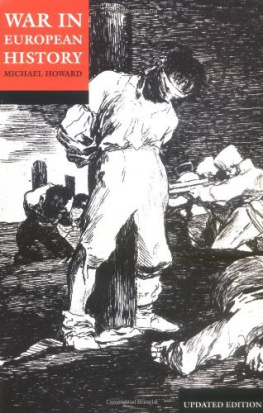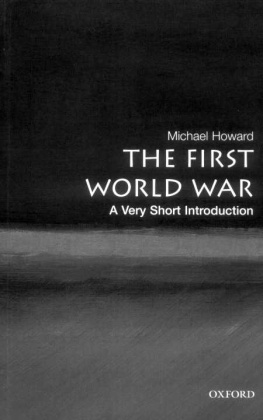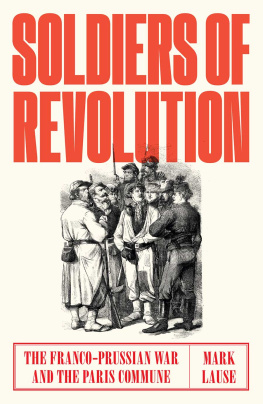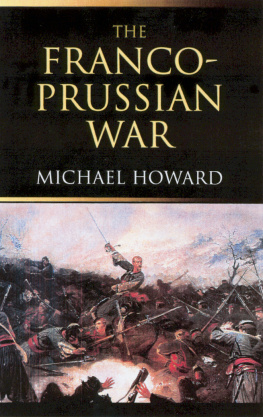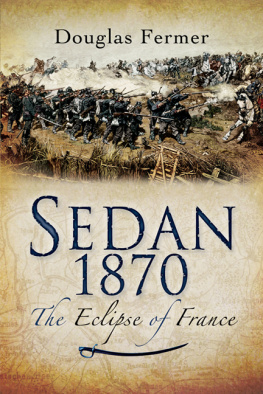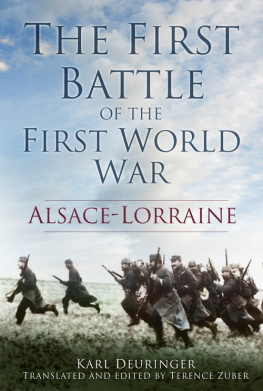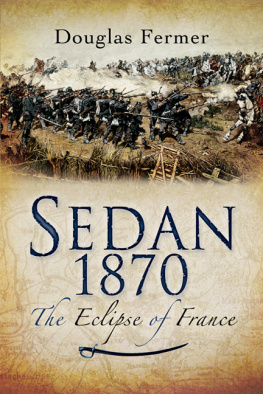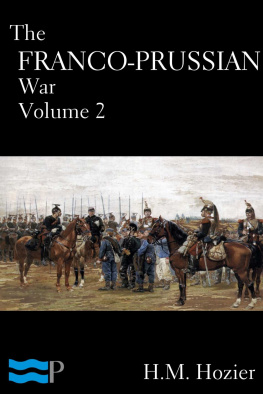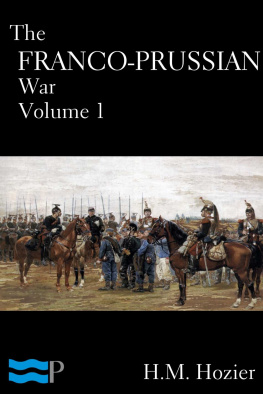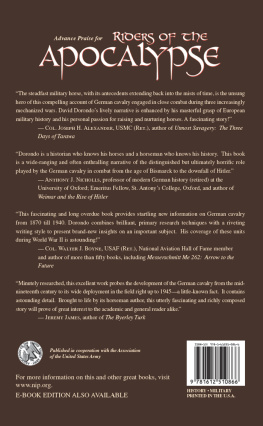Michael Howard - The Franco-Prussian War : The German Invasion of France, 1870–1871
Here you can read online Michael Howard - The Franco-Prussian War : The German Invasion of France, 1870–1871 full text of the book (entire story) in english for free. Download pdf and epub, get meaning, cover and reviews about this ebook. year: 2013, publisher: Routledge, genre: History. Description of the work, (preface) as well as reviews are available. Best literature library LitArk.com created for fans of good reading and offers a wide selection of genres:
Romance novel
Science fiction
Adventure
Detective
Science
History
Home and family
Prose
Art
Politics
Computer
Non-fiction
Religion
Business
Children
Humor
Choose a favorite category and find really read worthwhile books. Enjoy immersion in the world of imagination, feel the emotions of the characters or learn something new for yourself, make an fascinating discovery.

- Book:The Franco-Prussian War : The German Invasion of France, 1870–1871
- Author:
- Publisher:Routledge
- Genre:
- Year:2013
- Rating:4 / 5
- Favourites:Add to favourites
- Your mark:
- 80
- 1
- 2
- 3
- 4
- 5
The Franco-Prussian War : The German Invasion of France, 1870–1871: summary, description and annotation
We offer to read an annotation, description, summary or preface (depends on what the author of the book "The Franco-Prussian War : The German Invasion of France, 1870–1871" wrote himself). If you haven't found the necessary information about the book — write in the comments, we will try to find it.
The Franco-Prussian War : The German Invasion of France, 1870–1871 — read online for free the complete book (whole text) full work
Below is the text of the book, divided by pages. System saving the place of the last page read, allows you to conveniently read the book "The Franco-Prussian War : The German Invasion of France, 1870–1871" online for free, without having to search again every time where you left off. Put a bookmark, and you can go to the page where you finished reading at any time.
Font size:
Interval:
Bookmark:
The Franco-Prussian War
A superb study
The Guardian
A most valuable addition to historical literature
A. J. P. Taylor
I read it once a year. A beautifully written account of a close-run thing
Sir Julian Critchley
Michael Howard has analysed the origins and the events of this great war with thoroughness, clarity, and high narrative skill.
The Times
Of far wider significance than a simple history of a nineteenth-century war.
Spectator
Michael Howard has established himself as an historian of a high order.
The Times Literary Supplement
The Franco-Prussian War
THE GERMAN INVASION OF FRANCE, 18701871
MICHAEL HOWARD

FOR
Max Reese
AFTER TWENTY YEARS
First published 1961 by Rupert Hart-Davis Ltd
Reissued 1979 by Granada Publishing Ltd
First published as a University Paperback 1981 by
Methuen & Co. Ltd
Reprinted 1988, 1989, 1991, 1998, 1999, 2000
by Routledge
2 Park Square, Milton Park, Abingdon, Oxon, OX14 4RN
Simultaneously published in the USA and Canada
by Routledge
270 Madison Ave, New York, NY 10016
Second edition first published 2001
Reprinted 2002, 2006
Transferred to Digital Printing 2008
Routledge is an imprint of the Taylor & Francis Group, an informa business
1961, 2001 Michael Howard
Printed and bound in Great Britain by
TJI Digital, Padstow, Cornwall
All rights reserved. No part of this book may be reprinted or reproduced or utilised in any form or by any electronic, mechanical, or other means, now known or hereafter invented, including photocopying and recording, or in any information storage or retrieval system, without permission in writing from the publishers.
British Library Cataloguing in Publication Data
A catalogue record for this book is available from the British Library
Library of Congress Cataloging in Publication Data
A catalog record for this book has been requested
ISBN 10: 0-415-26671-8
ISBN 13: 978-0-415-26671-0
Contents
Maps
Abbreviations Used in Footnotes
D.O. | Enqute parlementaire sur les Actes du Gouvernement de la Dfense Nationale: Dpches tlgraphiques officielles (Versailles 1875). |
D.T. | Enqute parlementaire sur les Actes du Gouvernement de la Dfense Nationale: Dpositions des tmoins (Versailles 1873). |
G.G.S. | The Franco-German War 18701871 (London 187484). Translated from: Der deutsch-franzsische Krieg 187071. Redigirt von der kriegsgeschichtlichen Abteilung des Gross Generalstabes (Berlin 187281). |
Guerre | La Guerre de 187071, publie par la Revue dHistoire, rdige la Section historique de lEtat-Major de lArme (Paris 190113). |
M.M.K. | Moltkes Militrische Korrespondenz. Aus den Dienstschriften des Krieges 187071 (Berlin 1897). |
Reinach | Dpches, Circulaires, Dcrets, Proclamations et Discours de Lon Gambetta. Publis par M. Joseph Reinach (Paris 188691). |
Introduction
I T is now nearly fifty years since I started research for this book. I was when beginning to learn my trade as a military historian and this topic almost selected itself. I was fascinated by the transformation that had occurred in the whole nature of warfare between the Battle of Waterloo and the Battle of the Somme, and I felt rightly as it turned out that if I studied a war that occurred midway between the two I might begin to understand it. Senior Prussian commanders, including the King himself, had witnessed the last great battles of the Napoleonic wars. Whilst young Prussian lieutenants, notably Paul von Hindenburg, would preside over those of the First World War half a century later. There was an enormous amount of material easily available. True, much of the German documentation had been destroyed, but the bulk of it was available in print, as were most of the French documents in the military archives at Vincennes. I also hoped that by selecting a war in which my own country had not taken part I could rely on myself to write a reasonably dispassionate account. Finally, the battlefields themselves were accessible, and were still little changed since the war fought over them eighty years before.
Like most neophyte military historians, at least of those days, I expected to be able to explain the wars outcome through events on the battlefields themselves; the skill of the commanders, the nature of the armaments, the efficiency of the supply systems, the discipline and courage of the troops. But it rapidly became clear that these explanations were not in themselves enough. Certainly the German or more specifically, the Prussian armies were better commanded, better disciplined, and better supplied; but why? What had happened within Germany itself during the past fifty years to make this possible? Conversely, what had happened, or failed to happen, to France since the days of Napoleon to produce an army that turned so quickly into such a rabble? Gradually I came to realise, as I expressed it on the first page of the book, that the outcome of the war was the result not simply of faulty command but of a faulty military system; and the military system of a nation is not an independent section of the social system but an aspect of it in its totality. So a study of the war, indeed of any war, had to be rooted in a study, not simply of the armies, but of the societies that fought it. Military history was too serious a matter to be left to the military historians.
Even in terms of purely technical military history, the war remains a fascinating study. It was, like the American Civil War, on the cusp of military development, involving as it did the first large-scale use of railways and breech-loading firearms, with all these meant for strategy and tactics. Their mastery of these new tools goes far to explain the victories of the German armies up until the Battle of Sedan. But what I had not realised was the importance of events after Sedan and the surrender of Metz, when the whole of the French regular army had been taken prisoner but the war still continued, as a Peoples War for another five months. There had been a precedent of a sort in the spontaneous guerrilla campaigns against Napoleon in Spain, but never before had an entire nation continued fighting after its professional armies had been destroyed. From the point of view of the military historian, the Peoples War is a melancholy affair, but from that of the historian of war it is fascinating and sinister. It showed that in an age of democracy, wars cannot be won simply by the defeat of armies in the field: the will to fight has to be eradicated from the peoples who sustain them. In the First World War this would be done by bleeding the armies themselves to death and starving the civilian population. In the Second, that population could be directly attacked from the air. No one as yet has risked a Third.
It is pleasant for an author to find that his first work is still in print after forty years and is regularly consulted. French and German historians have said kind things about it, but it has not yet been translated into either language; perhaps because it describes a triumph of a kind that Germans nowadays do not want to remember, and a humiliation that the French do not want even a friendly foreigner to recall. But I hope that the book will continue to be read, if only as a chronicle of the emergence of what Gerhard Ritter well described as the sinister problem of modern national war, from which the great catastrophes of our epoch have developed; catastrophes that blighted the entire twentieth century, and in whose shadow we still live.
Next pageFont size:
Interval:
Bookmark:
Similar books «The Franco-Prussian War : The German Invasion of France, 1870–1871»
Look at similar books to The Franco-Prussian War : The German Invasion of France, 1870–1871. We have selected literature similar in name and meaning in the hope of providing readers with more options to find new, interesting, not yet read works.
Discussion, reviews of the book The Franco-Prussian War : The German Invasion of France, 1870–1871 and just readers' own opinions. Leave your comments, write what you think about the work, its meaning or the main characters. Specify what exactly you liked and what you didn't like, and why you think so.


